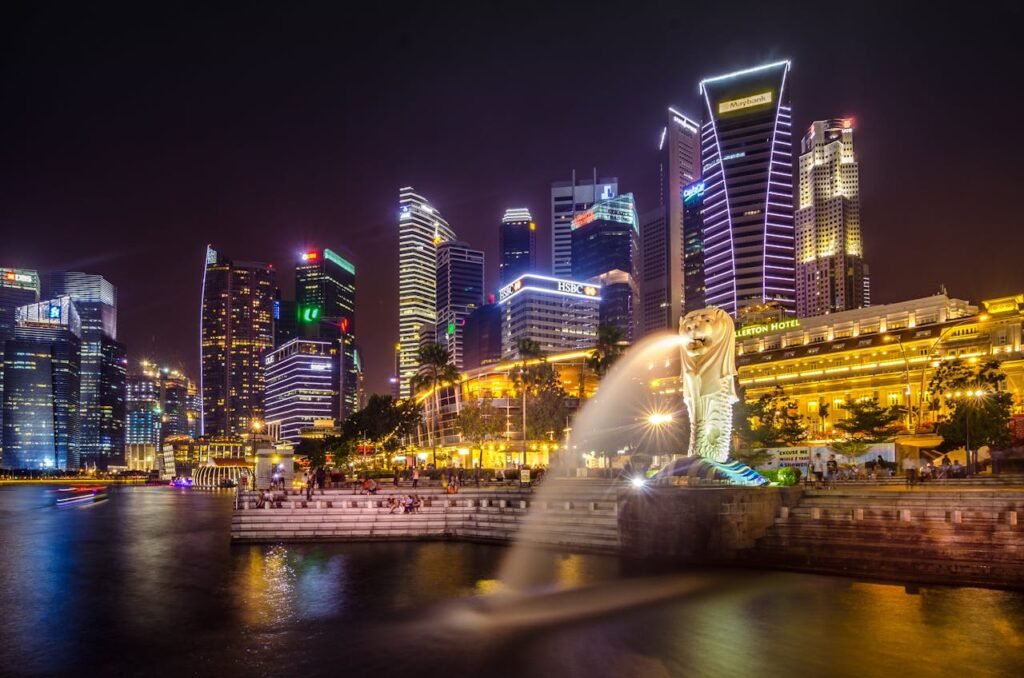Singapore has become an increasingly popular destination for international students, including those from Indonesia. Here’s why this small island nation is a big choice for higher education.
Singapore’s education system is highly regarded and consistently ranks among the best globally. Its universities, such as the Curtin University Singapore, Kaplan Singapore, Raffles Education Network, are renowned for their academic excellence and innovative research. The degrees from Singaporean institutions are internationally recognised and highly respected, providing graduates with a competitive edge in the global job market.

Why Singapore?
Location
Strategic Location Mobility & Transportation
Singapore’s strategic location in Southeast Asia makes it easily accessible from Indonesia, with numerous direct flights available. This proximity means that travelling between home and university is quick and convenient. The country also boasts a highly efficient and comprehensive public transport network, making it simple to get around and explore.
Quality of Education
Quality of Education
Singapore has an exceptionally strong reputation for its education system, which is consistently ranked among the best in the world by the OECD. This is a key reason why it’s a popular choice for international students. Here’s a closer look at what makes Singapore’s education so highly regarded:
Focus on Academic Rigour
Singaporean universities, globally recognised for their excellence. The education system places a strong emphasis on core subjects like mathematics and science, and it focuses on ensuring students have a deep and thorough understanding of the curriculum before moving on. This meticulous approach leads to high academic achievement and produces graduates with a solid foundation of knowledge.
Practical and Innovative Learning
While a strong academic foundation is a cornerstone, Singapore’s education system also prioritises the development of practical and critical thinking skills. Universities often incorporate project-based learning and encourage students to engage in real-world applications of their studies. This helps students develop essential skills needed in today’s job market, such as problem-solving, creativity, and analytical thinking.
International Recognition
Degrees from Singaporean universities are internationally recognised and highly valued by employers worldwide. The country’s strong investment in education and a commitment to maintaining high standards have cemented its reputation as a global education leader. This means that a qualification from Singapore provides graduates with a significant competitive advantage when they enter the global workforce.
Cost of Living in Singapore for International Students
Cost of Living in Singapore for International Students
While Singapore is known for being a global financial hub with a high cost of living, it’s possible for international students to manage their expenses with smart budgeting. The cost of living for a student can vary significantly depending on their lifestyle, chosen accommodation, and spending habits.
Here is an estimated monthly breakdown of costs for an international student in Singapore:
Accommodation
This is usually the biggest expense. Your cost will depend on whether you live on or off campus, and whether you have a roommate.
- On-Campus Accommodation: University dormitories are generally the most affordable option, with costs ranging from S1,500 per month. These rooms are often shared with a few other students.
- Private Student Hostels: These hostels often offer more amenities and can cost between S2,000 per month.
- Shared Apartments: Renting a room in a public housing flat (HDB) or a private apartment is a popular choice for students. The cost for a single room in a shared apartment can be from S2,500 per month, with private apartments being on the higher end of the range.
Food
Singapore is famous for its diverse food scene, and you can eat affordably if you know where to go.
- Hawker Centres and Food Courts: These are the most budget-friendly options, with a full meal costing just S8.
- University Canteens: A meal at a university canteen is also a good, affordable choice.
- Groceries: If you prefer to cook your own meals, your monthly grocery bill could be around S500, depending on your diet.
Transportation
Singapore’s public transport system is highly efficient and affordable.
- Public Transport: Students can use a concession pass for unlimited travel on the MRT (train) and buses. A monthly pass can cost between S120.
- Walking and Cycling: If you live close to your campus, walking or cycling can save you money and keep you active.
Other Expenses
Remember to factor in other monthly costs.
- Utilities and Internet: If you live in a shared apartment, utilities (electricity, water, gas) and internet can be around S150 per person.
- Books and Supplies: This can range from S150 per month, depending on your course.
- Personal Expenses: This includes toiletries, a mobile phone plan, and entertainment, and can range from S500 per month.
In total, a realistic monthly budget for an international student in Singapore would be around S2,500, excluding tuition fees. While this may seem high, remember that the quality of life, education, and career opportunities in Singapore often make it a worthwhile investment.
Job Opportunities & Graduate Prospects
Job Opportunities & Graduate Prospects
Singapore has a strong and dynamic economy, with a large number of multinational companies and thriving industries, particularly in finance, technology, and biotechnology. International graduates from Singaporean universities have excellent career prospects, as a Singaporean qualification is highly valued by employers both locally and globally. The government also offers various visa schemes to help graduates find employment after they finish their studies.

